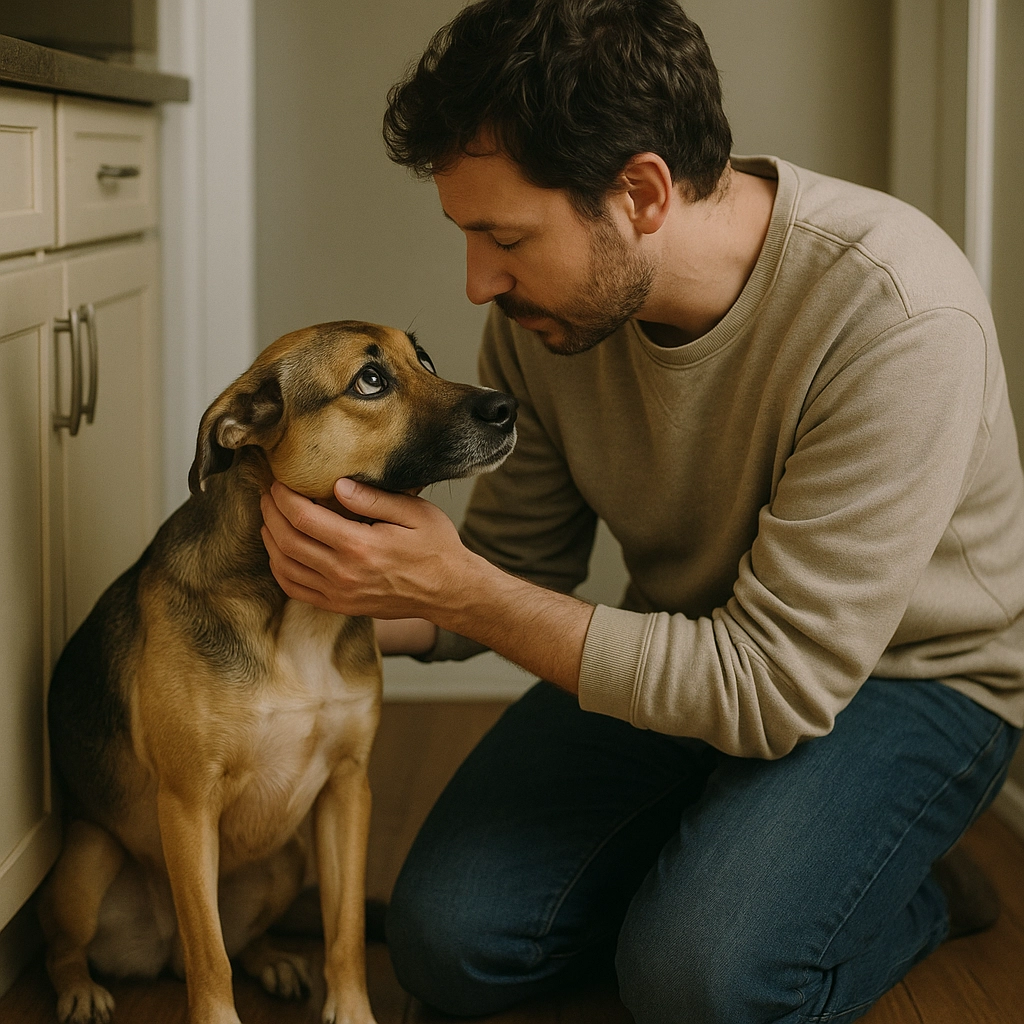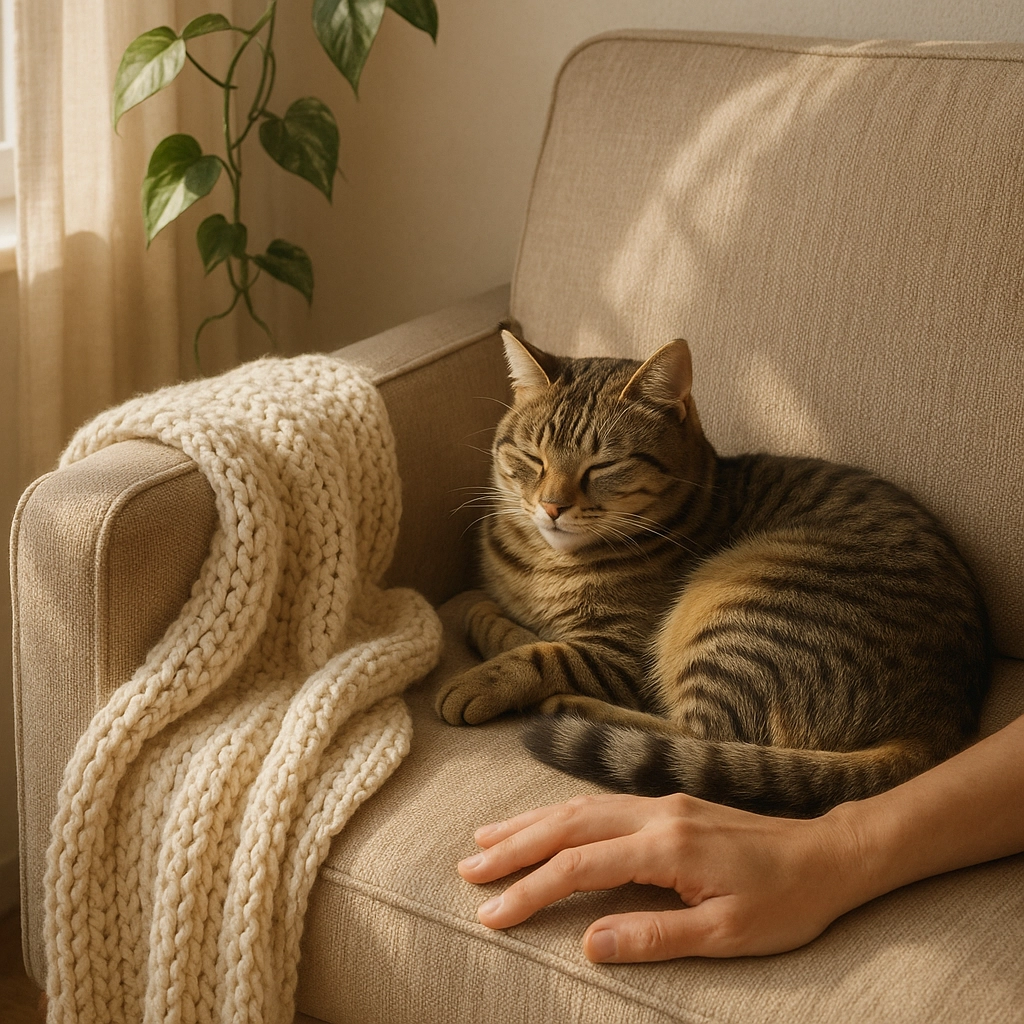Is My Pet Picking Up on My Stress? How Your Mood Affects Sensitive Animals
- Amanda Richardson
- Aug 4, 2025
- 4 min read
You know that moment when you sigh a little heavier after a long day—and suddenly your dog’s energy shifts, or your cat gives you one of those laser-eyed stares from the windowsill? You’re not imagining it. Sensitive pets, especially those who are anxious or behaviorally unique, often feel what you feel. If your dog seems “off” when you’re stressed, you’re both more attuned—and more human—than you think.
Why Your Mood Matters to Sensitive Pets
Let’s get something out in the open: there is zero shame in having emotions. Life throws curveballs at all of us, and pet parents aren’t robots (though, wouldn’t it be nice to never get frazzled at 7:30 a.m. on a Wednesday?). Sensitive pets read the emotional climate of your home the way we scan a forecast before a picnic.
For the pets who “feel things deeply,” your mood is more than background noise. It’s information—information that shapes how safe they feel in the world.
How Do Pets Detect Stress? The Amazing, Sciencey Part
You can’t fool your dog with a fake smile. Decades of research, plus thousands of everyday moments in multi-cat or multi-dog homes, tell us this: pets take in signals you might not even know you’re sending.
Scent: Your Mood Has a Smell
When you’re stressed, your body chemistry actually changes—your sweat, your breath, even the hormones your skin releases.
In one study, dogs correctly sniffed out a human’s “stress scent” with over 93% accuracy. That means your pup doesn’t have to see your furrowed brow; they might already “know” from one sniff at your pant leg.
They’re like furry mood detectors, picking up on what’s happening inside you, even if you’re trying to hide it.

Sound: The Song of Your Stress
Pets—especially dogs—tune in to tonality. If your tone sharpens or your voice shakes, even a little, they take note.
Researchers have found that dogs respond differently to people who sound worried or tense versus relaxed and happy.
That means your “it’s fine” said through gritted teeth? Yeah, they hear the truth underneath.
Body Language: What You Don’t Say Still Speaks
Dogs and cats are champions at reading body language. A stiff walk, slumped shoulders, fidgeting—these tiny “tells” are big signals to a sensitive pet.
It’s not just about dramatic displays; even subtle changes in your usual routine (skipping playtime, taking shorter walks, or changing feeding times) can tip off an observant animal that something’s up.
When Their Stress Syncs With Yours
Here’s where it gets especially real: science shows that our stress and our pets’ stress can actually synchronize. In one study, researchers found the stress hormone cortisol in dogs rose and fell in patterns that matched their owners. In other words, your anxious day at work might actually leave a biological mark on your dog’s body.
Think of it as emotional WiFi—always on, sometimes invisible, but very real when you’re both “on the same wavelength.”
Common Signs Your Pet is Picking Up on Your Stress:
Clinginess or following you from room to room
Hiding, paw licking, or pacing
Unusual vocalizing (whining, barking, yowling)
Changes in appetite or sleep
Regressive or “out of character” behaviors
If any of this sounds familiar, remind yourself: your pet isn’t being “bad”—they’re showing you that your emotional world and theirs are deeply connected.

How Sensitive Pets React: From “Velcro Dog” to “Ninja Cat”
Our clients at Nibbles and Yips often describe their sensitive pets as “shadows” during rough patches, sticking closer than usual. Others see the opposite—a dog who hides out of sight or a cat who becomes more aloof. There’s no single “right” reaction.
What matters is that behaviors shift for a reason. Sensitive pets aren’t trying to stress you out—they’re seeking safety, connection, or even just a little space from the tension.
Some real-world examples:
Frankie, one of our canine friends, becomes a professional cuddler the moment his pet parent’s work stress spikes. He’s not “needy”—he’s aware.
Luna the rescue pup retreats to her crate when family arguments ramp up. She’s protecting her peace, not being “antisocial.”
Even a chill, older cat might get vocal when the house is tense—it’s her way of asking “Are we okay?”
How to Support Your Sensitive Pet (and Yourself)
If you’re nodding along, welcome to the club. Every worried sigh, every anxious moment—they notice, but they don’t hold grudges. Your sensitivity makes you a safe harbor, not a failure. Here are a few gentle strategies to help both of you weather life’s emotional weather together:
Name What’s Happening
Speak honestly (yes, out loud) when you’re upset or worried: “It’s a rough day, buddy, but I’ve got you.” Validation models security, for pets and people alike.
Keep What You Can Consistent
Stick to familiar feeding, walking, and play routines as much as possible. Every small rhythm you can maintain is a little anchor for your pet’s sense of safety.
Create Comfort Corners
Give your pet easy access to their favorite spots—a cozy crate, a snug bed, or a tucked-away perch. You can even add something of yours (like a worn t-shirt) to offer extra reassurance through scent.

Move Gently Together
A slow walk (even if it’s shorter), a soft brushing session, or just lying quietly with your pet can reset both your nervous systems.
Notice Their Cues - And Forgive Yourself
If your pet is “clingy,” let them stick close if you can. If they need to hide, respect the distance.
Most importantly: release the guilt. No pet parent is perfectly calm 24/7. Your relationship is built on hundreds of good days, not one stressed afternoon.
When You Need Extra Support
Sometimes life gets overwhelming, and no deep breath is big enough to cover the waves. If you need backup—whether it’s for daily walks, enrichment visits, or a calm, steady sitter when work takes you away—we’re here to be part of your pet’s calm circle.
At Nibbles and Yips, we specialize in care that meets sensitive pets where they are, with staff who know the difference between “bad behavior” and a cry for support. Whether your dog hates when you leave, gets spooked on walks, or just needs a little extra patience, let’s work together to help your whole household feel safe and seen.
Want help navigating this with your pup or curious if trauma-informed care is right for your pet? Our team is always just a click or call away. Reach out—we’re here for you and your wonderfully sensitive sidekick.






